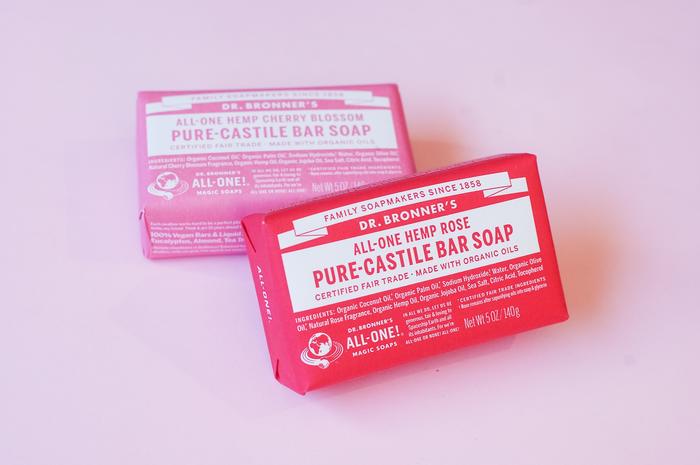I recently met up with Lisa Bronner, grand daughter of the famous Dr Bronner when she came to visit Australia and I asked her everything I'd always wanted to know about these special soaps.
’Castile soap was developed by my grandfather in the Castile region of Spain and was an olive oil based soap", says Lisa.
’A lot of people don’t realise that if soap is oil free soap, there is something really not going right there. All soaps are made from oil. So they took olive oil and made this wonderful soap, but it was solid. My family in the mid 1800’s was able to make liquid Castile soap, they were the first to develop this specific technology of liquid Castile soap. ’
’Nowadays ours is an olive oil, coconut oil and (sustainable) palm oil blend", explains Lisa. ’Olive oil is saponified which means it is turned into soap through a process where oil is combined with sodium hydroxide. The sodium hydroxide bonds with the oil molecule and forms a salt of fatty acid. Then the hydroxide part becomes water and the other by product of soap is glycerin. A lot of soaps drains off that glycerin and sell it, but we leave glycerin in because it makes the soap creamier. So, in our soaps you are going to have the soap, the glycerin and then we super pack the soap with moisturising hemp and herb oils."

CLICK HERE TO SHOP THE DR BRONNER'S RANGE NOW>
So how have Dr Bronner’s manage to create a range of soaps that feel and work as good - if not better than - the toxic stuff?
’Part of it is by totally ignoring the idea that we were all sold in the aftermath of World War II and that there is better living through chemistry", Lisa says. ’People really thought everything that was natural was unstable and unpredictable and everything that was made in the laboratory was trustworthy, because they could control it. Also, the equipment and factories that were being used to make weaponry were no longer needed after the war, so they were put to use making up chemical concoctions."

’Dr Bronner was old fashioned and he just stuck with the ingredients that was very close to nature", says Lisa of her grandfather. ’One step removed olive oil straight from a plant and you did one thing to it and you got soap. Bi-products and processes that are using really toxic things give you a product that is not great with all those dangerous manufacturing methods. After the war, people bought into the idea that the technology and the advancements and the chemistry and the bio-technology were not understandable to the average person. T
hey really sold themselves short. They felt that they couldn’t understand it because they were not smart enough and trusted that these big corporations were doing their thinking for them and they must know what’s best. Well that was a terrible assumption, a terrible assumption to think that the chemical companies’ prime motivation was the wellbeing of the customer. No, the primary motivation is to make money. If they can do that through something that is cheaper and faster, then that’s the top priority."
’People also bought into the idea that it’s the government’s job to watch out for us", explains Lisa. However, when it comes to personal care products, they have absolutely nothing to do with it. There is no oversight. There is no regulation. There is regulation on drugs, there is regulation on food but there is not regulation of personal care products. So people kind of blindly trusted the government wouldn’t let it out be there if it is dangerous. That’s not their job. Nobody is doing that and so people instead need to be thinking for themselves and understanding what they are using and taking a moment to stop and read the ingredient list. They need to be thinking I don’t understand this gobbledygook, it looks crazy and then going on and finding products that are understandable. That their mind understands them, their body understands. They don’t build up toxins in the body, and that’s the way to go."
CLICK HERE TO SHOP THE DR BRONNER'S RANGE NOW>


